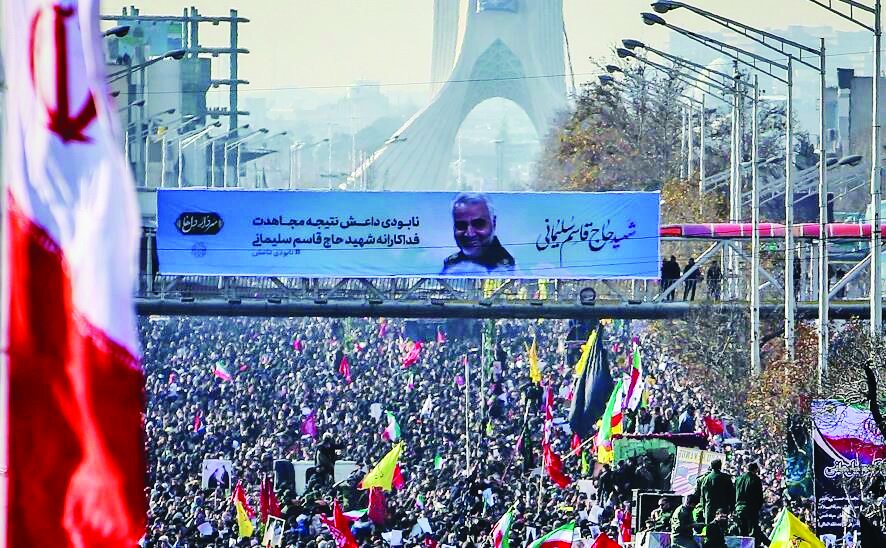

The one year anniversary of Major General Soleimani’s assassination is the perfect moment to reflect on the significance of this unforgettably historic crime. The world was aghast when they learned that Trump ordered U.S. drones to kill the Iranian military leader in Baghdad’s airport, which immediately raised fears of a larger war throughout the region.
These worries were grounded in the reality that the U.S. and Iran had already been involved in a Cold War for decades that was increasingly turning hot under the Trump Administration. It’s for this reason that many expected Iran to kinetically respond, which might, in turn, lead to an American escalation.
Iran’s response came shortly after when it launched a series of missile strikes against U.S. bases in Iraq. The exact specifics of what took place are still unclear but the fact of the matter is that these facilities were devastated even though no loss of life officially occurred. This led to many wondering whether Iran’s promised response was indirectly communicated to the U.S. through third parties like some reported at the time for the purpose of keeping tensions between the two under control in order to avoid the worst-case scenario of World War III. Even if that’s what ended up transpiring, the significance of these strikes was momentous.
“As the world mourns the martyrdom of Major General Soleimani on the one year anniversary of his assassination, they should also realize that he’s just as powerful dead as alive.” Never before in history has another country struck several U.S. military bases in such a way with impunity. It’s unimportant whether Iran’s response was choreographed with America ahead of time or not since the soft power impact is unmistakable. The optics are obvious, and it’s that the U.S. post-Old Cold War military reputation of invulnerability was shattered as a result. Washington knew that escalating everything with Tehran even further would probably have crossed the tripwire into triggering a regional conflagration, the collateral damage of which would have been unacceptable for its regional allies like “Israel” and the (P)GCC.
In a sense, one can say that the U.S. was somewhat held hostage to the interests of those same regional allies. While it arguably enters into various military adventures in the region in their support, its flexibility in responding even further to Iran was extremely limited since anything more would have likely provoked the feared scenario of an uncontrollable regional conflict, one in which America’s allies would likely suffer just as much as — if not more than — Iran. In other words, even though the American homeland would have probably escaped largely unscathed, “Israel” and the (P)GCC would have been destroyed, which was unacceptable for it.
The reason for predicting such a dire outcome is that Iran’s missile technology advances of the past decade have succeeded in serving as a powerful deterrent to most forms of regional aggression, which is the main reason that Trump wanted to impose drastic curbs on it as a precondition for re-entering the JCPOA among other demands. Without these missiles, Iran would never have been able to respond to the U.S. after it assassinated Major General Soleimani in such a way that it shattered its adversary’s precious soft power, nor would America have been deterred from escalating everything further out of fear for its regional allies’ safety.
Reflecting on all of this, it’s unclear whether Trump regrets assassinating Major General Soleimani in hindsight. It’s true that he succeeded in inflicting a powerful blow to Iran, but Iran nevertheless responded by ruining America’s post-Old Cold War military reputation of invulnerability. In addition, Iran continues to support its regional Resistance allies, which proves that while its martyr was immensely important in this respect, he wasn’t irreplaceable like the U.S. claimed. The Resistance has always been about much more than a single person since it’s a movement for peace, justice, and national sovereignty, among other goals.
Objectively speaking, it can therefore be assessed that Trump made a mistake by assassinating Major General Soleimani. The resultant shattering of his country’s soft power was an unacceptable cost for carrying out this unforgettably historic crime which failed to stop the Resistance’s regional activities. The American leader proved his loyalty to the U.S. regional “Israeli” and (P)GCC allies, but his country also paid a harsh cost in terms of the irreparable damage to its reputation. As the world mourns the martyrdom of Major General Soleimani on the one year anniversary of his assassination, they should also realize that he’s just as powerful dead as alive.
*Andrew Korybko is a political analyst, journalist, and a regular contributor to several online journals, as well as a member of the expert council for the Institute of Strategic Studies and Predictions at the People’s Friendship University of Russia. He has published various works in the field of Hybrid Wars, including “Hybrid Wars: The Indirect Adaptive Approach to Regime Change” and “The Law of Hybrid War: Eastern Hemisphere”
Related posts:
Views: 0
 RSS Feed
RSS Feed

















 January 4th, 2021
January 4th, 2021  Awake Goy
Awake Goy  Posted in
Posted in  Tags:
Tags: 
















